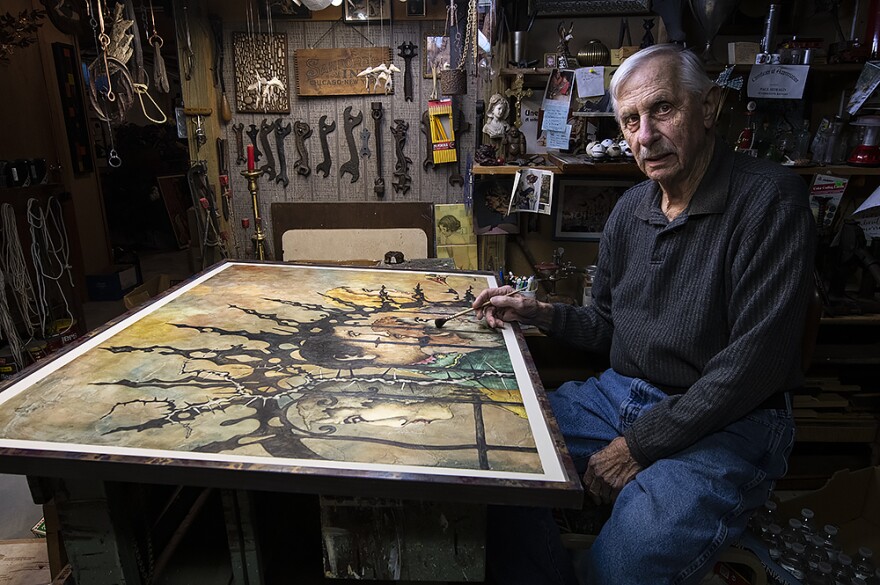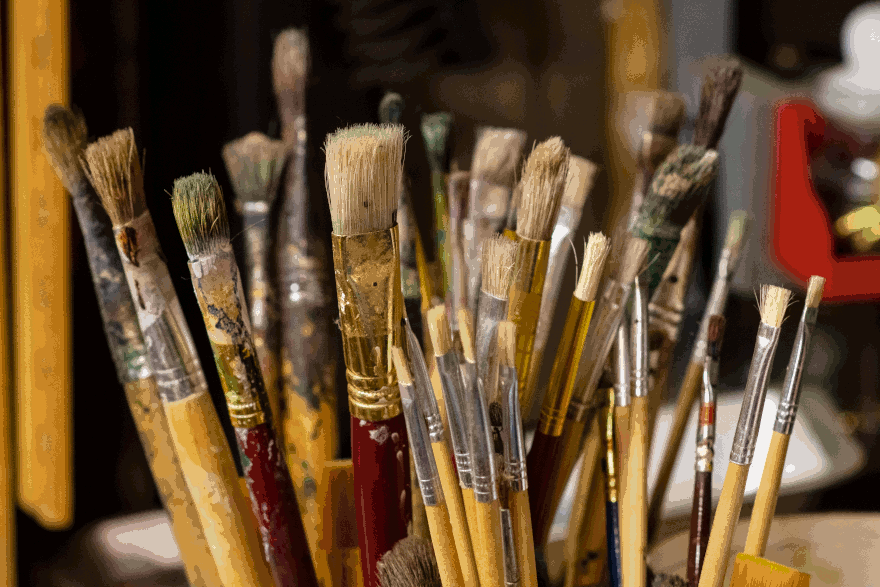Biography: Paul Seiwald

Paul Seiwald in his basement studio near Vermillion, Kansas.
Photo courtesy of Julie Denesha, KCUR.
Born in 1930, Paul Seiwald created mainly for his own satisfaction and his paintings were either given away to friends and family or stored away in his basement as soon as they were completed.
A self taught artist, Paul completed over 300 paintings and sculptures throughout his life. His style of painting has been compared to Thomas Hart Benton, Salvador Dali and Dr. Seuss.
His first attempt at painting was a paint-by-number kit but over the years, he carefully observed the techniques of artists he admired most: Klimt, Matisse, and Thomas Hart Benton.
Instead of painting on canvas, he painted on plywood panels textured with wood putty and he also created the frames.
The Red Barns
The most recurring subject of his paintings is an old red barn surrounded by surreal trees and barbed-wire fence-posts. Sometimes the barns play silent witness to events in his paintings and sometimes they seem to represent a place his characters could sneak off to for a romantic hideaway. Sometimes the barn is part of a story and sometimes it's merely the subject (a portrait of a barn). The painting entitled "WHOT?" features a derelict barn with disquieting eyes peering out from within but who (or whot) the eyes belong to is not clear.
He produced at least 96 "RED BARN" paintings with titles that increment e.g, "PRAIRIE RED BARN No. 24", "RED BARN No. 51", "RED BARN No. 56", "RED BARN No. 67", "RED BARN No. 82", "RED BARN No. 85", "RED BARN No. 96".
Mysterious Rural People
Other subjects include rural people involved in courtship, progeny and conflict.
Distinctive features of his subjects include elongated faces and what appears to be mascara running from their eyes or dirt infused sweat-streaks streaming down their faces. Some are surrounded by thorny plants or depicted with thorns growing from their fingertips while others are portrayed with prosthetic or artificial body parts. Many of the elaborate costumes are based in fantasy and not reality.
Some of the subjects are recurring and appear in various stages of life - most notable is a striking blond woman and a boyish man with brown hair.
An Imaginary World
Seiwald's brother, Dee, and daughter, Karen, say the subjects in his paintings are not self-portraits and do not represent anyone from his real life.
In a 2019 interview with KCUR | NPR, Paul was unable to shed light on the meaning behind his paintings because he was having trouble remembering things.
Paul's daughter, Karen Faust, said about his paintings "I don't always understand but I love to just look at Dad's thoughts. Sometimes I think I know what he's thinking and then sometimes I'll look at it again and think, 'I have no idea.'"

Basement studio of Paul Seiwald and daughter, Karen.
Photo courtesy of Julie Denesha, KCUR.

Paul consistently printed titles on the back of his paintings in the upper left hand corner in all caps.
Subliminal Art
The Flower Ladies:
Almost all of Paul Seiwald's floral paintings appear to be a subliminal representation of a woman and sometimes they are accompanied by a guest who is also represented subliminally (the guest is usually male but not always). Known examples include: "AFTER DINE", "FLOWER GUARDIAN", "FOOTED VASE", "FLORAL WITH-A DAISY", "TEA TIME WITH SUGAR".
More examples of subliminal 'flower ladies' may include:
"GARDEN EDGE",
"SECOND CHANCE",
"RED WALL FLOWERS",
"OFF THE WALL",
"SYMBOLIC",
"untitled flowers in vase" and
"WHITE LIGHTNING".
Erotic Interpretations:
Many of the erotic subjects are represented subliminally and often the title provides a hint causing the spicy subject to reveal itself. Known examples include: "TWIN MOUNDS RED BARN", "TEA TIME WITH SUGAR" and "JUST BEHIND THE MUFFLER SHOP".
Additional Subjects
Additional subjects include floral still lifes, mixed media, homage and erotica. He produced at least 10 floral still lifes, at least 6 mixed media pieces, at least 4 homage paintings with titles that begin with "ESSENCE OF . . .", and at least 28 erotic paintings. At least 10 paintings have religious themes or have titles that invoke religious meaning.
Titles
Paul consistently printed titles on the back of his paintings in the upper left hand corner in all caps.
Sometimes the title provides a clue to the meaning of the painting - examples include: "PUSH", "GIFT OF SELF", "GIFT OF SELF - 4", "GARDEN TOUR", "COED" and "GATEPOST USA".
Titles that increment are red barns, bird nests, fenceposts and gateposts. He painted at least 96 "RED BARN" paintings, at least 6 bird nest paintings, at least 7 fencepost paintings and at least 10 gatepost paintings.
Personal Life
Paul Seiwald was born January 7th, 1930 in Eudora, Kansas.
In the 1950s, he enlisted in the United States Army where he achieved the rank of sergeant and was awarded two Bronze Stars during the Korean War.
In 1983, Seiwald retired from a career as a research chemist at Midwest Research Institute and moved with his wife, Mary, to a small farm in Vermillion, Kansas.
Paul passed away June 8, 2023 in a care facility just a few miles from his farm and was inurned in St. Joseph Catholic Cemetery in Lillis, Kansas.